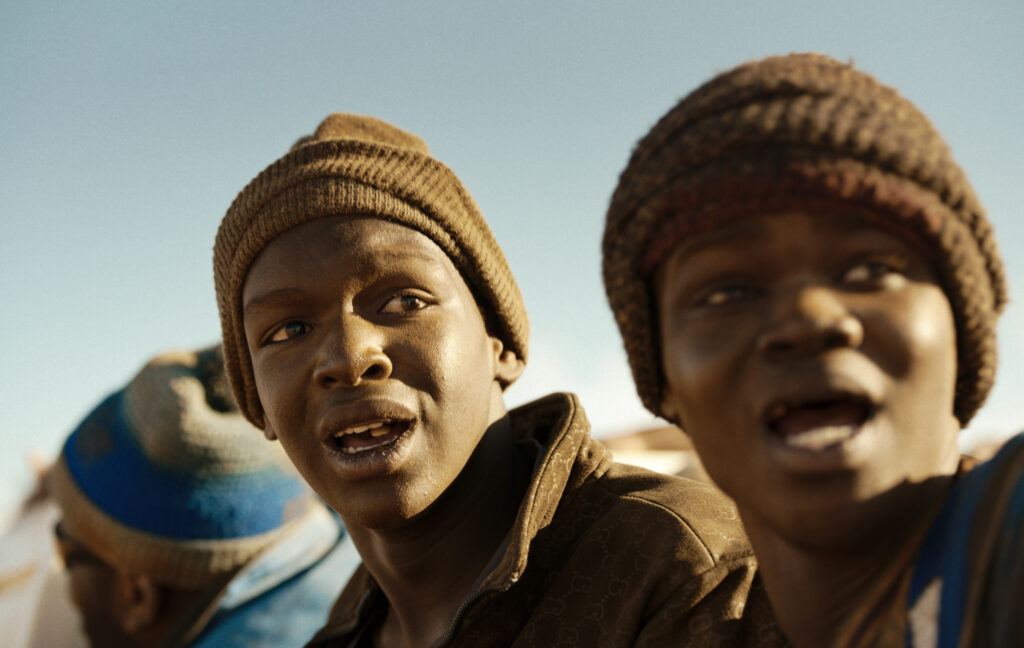Io Capitano – Snapshot
Io Capitano tells the harrowing story of two teenage boys, in search of adventure and burdened with the responsibility of supporting their families, trying to get to Italy. They get caught in a now too-familiar dark web of human trafficking and abuse. While the story had promise, the movie lacks purpose and fails to define a consistent tone (2*)
Where to Watch:
Stream: (nowhere)
Rent: Prime/YouTube/Fandango/Google ($5) Apple ($6)
Io Capitano – The Oscar Buzz
Oscar Nominations (1) / Oscar Wins (0) :
International Feature (Italy)
Io Capitano is this year’s International Feature film from Italy. Although the very end of the film takes place in Italy, the film is set and was filmed in Africa, starting in Dakar, Senegal, moving to Niger, and on to the Saharan Desert and Libya. (The desert and Libyan scenes were filmed in Morocco). Io Capitano is very much, an International Feature.
The movie is the brainchild of Italian filmmaker, director and co-writer Matteo Garrone. Of the four films he is most noted for, I’ve only seen his 2019 version of Pinocchio, which received an Oscar nomination for some pretty incredible Makeup work. While I agreed with that particular nomination, I found the film generally lacking noting that it felt like it was “slopped together” and that while “the idea was right for this film, it just wasn’t executed with the proper attention, feeling, and care.” And I ultimately only gave it 2.5*!
Io Capitano is, structurally, an improvement over his Pinocchio. But it also shares with it some of Garrone’s signature fascination with what might be labeled “Italian surrealism”. There are two scenes in Io Capitano that invoke a kind of shamanistic mysticism, but, ultimately, don’t add anything at all to the story. As I said about his Pinocchio, those scenes “should have been left on the cutting room floor.” Nonetheless, Garrone brought a team of writers and his go-to editor, production designer, and makeup guru from his earlier films to this one.
The credits also include seven “collaborating writers”! Although I’m not exactly sure what that means, I suspect these seven are people Garrone consulted and who are real-world examples of African immigrants, sharing their stories. In that sense, Io Capitano is sort of an amalgam of true experiences.
The two actors (Seydou Sarr and Moustapha Fall) portraying the main characters in Io Capitano are, as I understand it, native Senegalese and this is their feature film debut. While these aren’t Oscar-worthy performances, it is fun to watch them in the film mature into young men in a very short period of time while enduring hardships most of us can’t even begin to imagine. You can’t help but feel compassion for them, and that means the actors are starting out their careers with promise. Too bad, though, it wasn’t in a better movie.
Io Capitano – Related Movies
Pinocchio (19)/Dogman (Direction, Screenplay, Editing,Production Design, Makeup)
Tale of Tales (Direction, Screenplay, Editing, Production Design)
Gomorrah (Direction, Screenplay, Editing)
Io Capitano – What Others Think
Like last week’s movie, Perfect Days, this is a film that the viewing public liked better than the critics, although probably for different reasons. Viewer ratings placed Io Capitano second out of the five International Features, and 13th out of all 38 nominated films, tied with Society of the Snow, Nimona, and The Color Purple. Some viewer headlines included “Superb filmmaking at its finest – do not miss”, “A painful masterpiece”, and “Brilliant Use of film”!
Critics ended up putting this film at the bottom of the five International films (tied with Perfect Days) and 17th out of all 38 films, tied with May December and the documentary Four Daughters. These aren’t bad ratings overall, they just aren’t as positive as viewer reaction.
Professional reviews generally gave the film a few kudos while panning other qualities. Katie Rife (RogerEbert) said that it “is frustratingly just good enough, and no better.” She likens it to “misery porn” “where a film wallows in the suffering of its characters, usually characters of color, for the edification of a presumed white audience.” Jason Anderson (Sight&Sound) suggests that the film contains “references to the questing heroes of Homer.” And the comparison to Homer grates on me a bit because I don’t think it is at all appropriate to compare human trafficking to a Homerian epic – it demeans both the film and Homer! On the opposite end of the spectrum, Manohla Dargis (New York Times) gave the film a Critics Pick and suggests that Garrone has “visual clarity and narrative urgency” and a “tenderness of touch which works as a kind of force field that keeps your own despair at bay and your sympathies on his complicated, transparent achingly hopeful characters.” Dargis sees way too much in this movie.
Most critics, although not Dargis, noticed Garrone’s interest in “mystical realism”. Jason Anderson found “Elements of dream, myth, and fantasy continually intrude on what might otherwise seem like a hard-nosed portrayal.” And later “the filmmaker is hardly averse to more florid and ostentatious gestures…this combination of approaches can sometimes be jarring.” I agree with that and will talk more in the final section.
Overall, Io Capitano ranks second out of the five International features (behind Perfect Days) and in the middle of all 38 nominated films, tied with Four Daughters, Robot Dreams, and Poor Things!
Io Capitano – Special Mention
European Immigration from Africa – For a variety of reasons, getting precise information on the number of immigrants from Africa to Europe is, at best difficult. Some estimates are that there are 11 million African immigrants spread across the countries of Europe. If that is a correct number, it represents just 1.5% of Europe’s entire population of 746 million (in 2019). Most of the “illegal” immigrant population are people who legitimately traveled to Europe, for work or pleasure, and then overstayed their visas.
Of course, that isn’t exactly the image we are presented with since it is the much smaller numbers arriving by boat illegally, usually being trafficked that make the headlines. Interestingly, illegal immigration has been a problem for decades, but most of it earlier was from Northern African countries such as Libya, Morocco, Algeria, and Tunisia. The problem became much more controversial in recent times when the source of Africans shifted from north of the Saharan desert to sub-Saharan, and Black, Africa. It is difficult to separate the rise in anti-immigration sentiment from simple racism.
But I don’t want to minimize the problems of human trafficking. The boys in Io Capitano are Black Senegalese kids in search of a certain amount of adventure, but also trying to support their families. The harrowing account of their journey is important to understand even if they represent a small proportion of the total immigration picture. An estimated 57,000 people who have tried to make this journey are confirmed dead or missing – that is not a number to be ignored.
Io Capitano – Michael’s Moments
Let’s get one complaint out of the way quickly – Io Capitano would have been a much better film if Garrone had left out the two “mystical realism” scenes. At around the 45 minute mark there is a ridiculous scene where Seydou “escorts” a dead woman through a portion of the desert. And there is another absurd scene about 12 minutes later involving a boy who takes Seydou back to tell his Mother that he is alive and OK (the boy flies, while Seydou hikes through the desert!). Neither scene makes any sense, nor does it actually lead to anything. We don’t see his mom’s reaction to the knowledge she supposedly learns. Of course, neither scene actually happens except in Seydou’s mind, but there is really no point to them and Garrone is wasting his, and our, time exploring his own fantasy world.
If you extract those two scenes, there is an intriguing and gut-wrenching story in Io Capitano. The experiences of these two boys, especially Seydou, run the full spectrum of good and evil and, in this one journey, Seydou becomes a man. That story is possibly worth watching the movie for. And the performance from Seydou Sarr (who plays Seydou) is inspiring.
But there are also some very difficult problems with the inconsistent emotional tone of the film. The early scenes of the two cousins and best friends in Dakar, Senegal is well done and we learn much about their lives and especially their love for their families and each other.
The tone begins to change to a much darker feeling when they start their journey across the desert. The desert cinematography in Io Capitano evokes National Geographic images and serves as a stark contrast to the difficulties of navigating across the sand dunes. But we don’t learn much during this journey about exactly what the boys are feeling – events happen, including one of the extraneous mystical sequences – but it doesn’t develop the boys’ relationship or characters at all and feels almost tacked on.
Then we are thrown into the depths of depravity in Tripoli, Libya. Many viewers will find this portion of Io Capitano difficult to watch. While in prison, Seydou is befriended by an older man, Martin, who apparently sees some of his own son in his fellow prisoner. And then, in a rather improbable sequence, he helps Seydou earn his way out of slavery. The sequences with Martin helps to some extent restore a belief in humanity after the prison scenes, but at this point we are kind of stretching probabilities. It is also very unclear where Garrone is trying to lead us.
But perhaps the least satisfying part of the film is the last part, the boat ride to Italy. Nothing really happens and that leaves us with a sort of “so what” feeling and while the film ends with swelling music and smiles, we have no idea what happens next. The tonal shift is one into disappointing ignorance after a sequence on the ocean that suggested something else might happen, but it never does.
In short, Io Capitano, much like Garrone’s earlier work Pinocchio, feels so much like a bunch of intriguing ideas cobbled together without a coherent idea of what he wants to tell us. That’s not a good movie! (2*)


